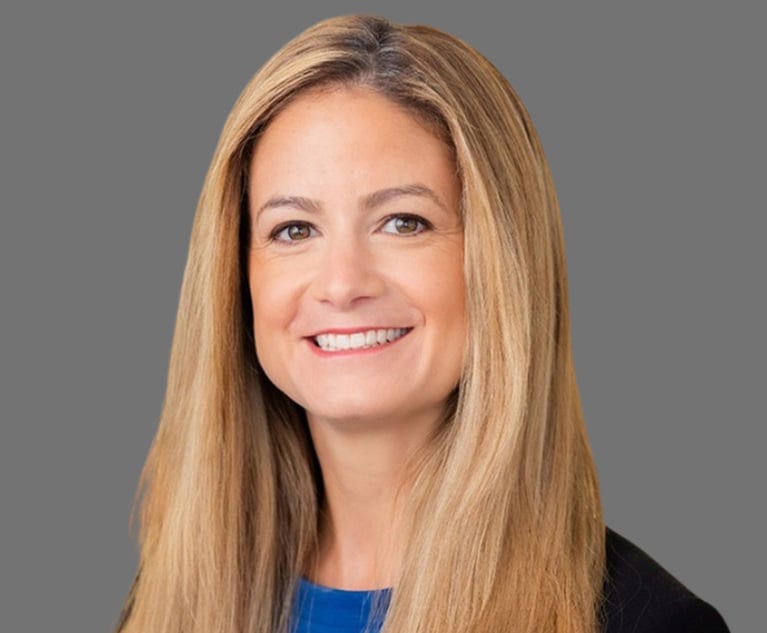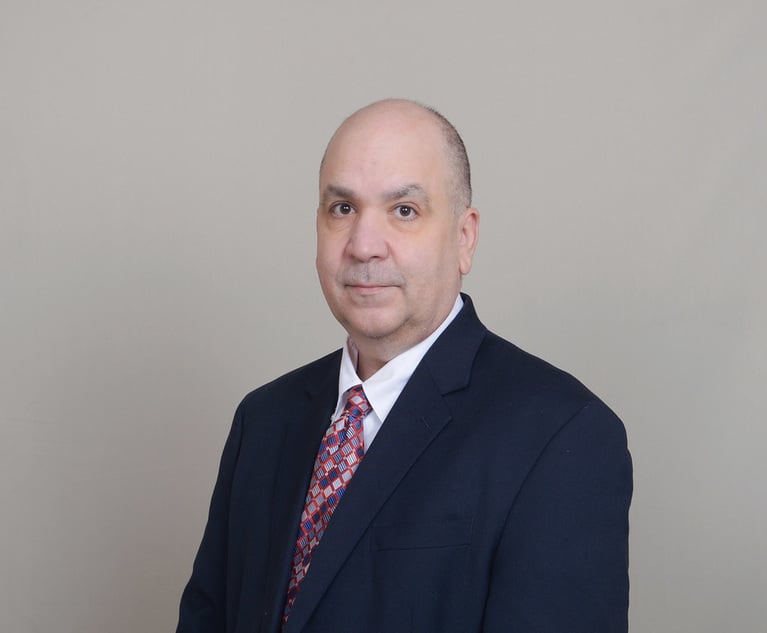In Pa. Case, 3rd Circ. Reinstates Inter-Hospital RICO Battle Over Reimbursements
A lawsuit by a group of Pennsylvania hospitals suing other in-state hospitals for alleged RICO fraud in obtaining reimbursements for treating indigent patients has been reinstated by the U.S. Court of Appeals for the Third Circuit.
July 23, 2020 at 10:59 AM
3 minute read
 Credit: Shutterstock.com
Credit: Shutterstock.com
A lawsuit by a group of Pennsylvania hospitals suing other in-state hospitals for alleged RICO fraud in obtaining reimbursements for treating indigent patients has been reinstated by the U.S. Court of Appeals for the Third Circuit.
A three-judge appellate panel ruled in St. Luke's Health Network v. Lancaster General Hospital that the case was improperly dismissed for failure to demonstrate standing for a civil Racketeer Influenced and Corrupt Organizations Act claim, as the plaintiffs allegations were plausible enough to proceed.
According to Third Circuit Judge Joseph Greenaway's July 22 opinion, the St. Luke's Hospital network sued Lancaster General and the University of Pennsylvania health systems, alleging they abused the federal Department of Health and Human Service's Extraordinary Expense (EE) program, enacted under the Tobacco Settlement Act to reimburse hospitals for treating uninsured patients. Hospitals are audited to keep track of their uses of the funds.
The plaintiffs, on behalf of all EE participating hospitals, claimed John Does working for the defendants "knew that [Lancaster's] claims were grossly inflated but nevertheless continued to submit them even after being called out by the auditor general." They claim the defendants committed wire fraud to inflate Lancaster General's coffers by $9 million from fiscal years 2008 to 2012.
The defendants moved to dismiss the complaint, arguing that their alleged conduct did not amount to a proximate cause of injury to the plaintiffs under the RICO act, according to Greenaway. The district court agreed and dismissed the case.
But on review, the Third Circuit held that the plaintiffs did provide sufficient facts to sustain a civil RICO claim.
"At the outset, it is important to specify the purported conduct constituting a RICO predicate and the resulting injury. The complaint shows that plaintiffs' theory of liability extends to defendants' submission of allegedly fraudulent claims between Fiscal Years 2008-2012. Plaintiffs therefore claim collective injury in the form of a decreased proportion of EE program funds during each of those years," Greenaway said.
The judge said the case at hand was "nearly identical" to the U.S. Supreme Court case Bridge v. Phoenix Bond & Indemnity. In that case, perspective buyers of tax liens sued other buyers claiming they committed fraud to get a greater share of liens.
"Plaintiffs' theory of liability and alleged injury in the present case are nearly identical to that of the Bridge plaintiffs," Greenaway said. "Because the EE Program has a fixed pool of assets, defendants' alleged manipulation to increase their share of the limited funding necessarily resulted in plaintiffs receiving a decreased proportion of those assets. So, we must similarly conclude that plaintiffs have adequately demonstrated proximate causation for purposes of civil RICO standing."
Kevin Fay of Eckert Seamans Cherin & Mellott in Philadelphia represents the defendants and did not respond to a request for comment. Brian Barnes of Cooper & Kirk in Washington, D.C., represents the plaintiffs and did not respond to a request for comment.
This content has been archived. It is available through our partners, LexisNexis® and Bloomberg Law.
To view this content, please continue to their sites.
Not a Lexis Subscriber?
Subscribe Now
Not a Bloomberg Law Subscriber?
Subscribe Now
NOT FOR REPRINT
© 2025 ALM Global, LLC, All Rights Reserved. Request academic re-use from www.copyright.com. All other uses, submit a request to [email protected]. For more information visit Asset & Logo Licensing.
You Might Like
View All

JCPenney Customer's Slip-and-Fall From Bodily Substance Suit Best Left for a Jury to Decide, Judge Rules
4 minute read
People in the News—Jan. 9, 2025—Rawle & Henderson, Armstrong Teasdale
3 minute read
Law Firms Mentioned
Trending Stories
- 111th Circuit Rejects Trump's Emergency Request as DOJ Prepares to Release Special Counsel's Final Report
- 2Supreme Court Takes Up Challenge to ACA Task Force
- 3'Tragedy of Unspeakable Proportions:' Could Edison, DWP, Face Lawsuits Over LA Wildfires?
- 4Meta Pulls Plug on DEI Programs
- 5On the Move and After Hours: Meyner and Landis; Cooper Levenson; Ogletree Deakins; Saiber
Who Got The Work
Michael G. Bongiorno, Andrew Scott Dulberg and Elizabeth E. Driscoll from Wilmer Cutler Pickering Hale and Dorr have stepped in to represent Symbotic Inc., an A.I.-enabled technology platform that focuses on increasing supply chain efficiency, and other defendants in a pending shareholder derivative lawsuit. The case, filed Oct. 2 in Massachusetts District Court by the Brown Law Firm on behalf of Stephen Austen, accuses certain officers and directors of misleading investors in regard to Symbotic's potential for margin growth by failing to disclose that the company was not equipped to timely deploy its systems or manage expenses through project delays. The case, assigned to U.S. District Judge Nathaniel M. Gorton, is 1:24-cv-12522, Austen v. Cohen et al.
Who Got The Work
Edmund Polubinski and Marie Killmond of Davis Polk & Wardwell have entered appearances for data platform software development company MongoDB and other defendants in a pending shareholder derivative lawsuit. The action, filed Oct. 7 in New York Southern District Court by the Brown Law Firm, accuses the company's directors and/or officers of falsely expressing confidence in the company’s restructuring of its sales incentive plan and downplaying the severity of decreases in its upfront commitments. The case is 1:24-cv-07594, Roy v. Ittycheria et al.
Who Got The Work
Amy O. Bruchs and Kurt F. Ellison of Michael Best & Friedrich have entered appearances for Epic Systems Corp. in a pending employment discrimination lawsuit. The suit was filed Sept. 7 in Wisconsin Western District Court by Levine Eisberner LLC and Siri & Glimstad on behalf of a project manager who claims that he was wrongfully terminated after applying for a religious exemption to the defendant's COVID-19 vaccine mandate. The case, assigned to U.S. Magistrate Judge Anita Marie Boor, is 3:24-cv-00630, Secker, Nathan v. Epic Systems Corporation.
Who Got The Work
David X. Sullivan, Thomas J. Finn and Gregory A. Hall from McCarter & English have entered appearances for Sunrun Installation Services in a pending civil rights lawsuit. The complaint was filed Sept. 4 in Connecticut District Court by attorney Robert M. Berke on behalf of former employee George Edward Steins, who was arrested and charged with employing an unregistered home improvement salesperson. The complaint alleges that had Sunrun informed the Connecticut Department of Consumer Protection that the plaintiff's employment had ended in 2017 and that he no longer held Sunrun's home improvement contractor license, he would not have been hit with charges, which were dismissed in May 2024. The case, assigned to U.S. District Judge Jeffrey A. Meyer, is 3:24-cv-01423, Steins v. Sunrun, Inc. et al.
Who Got The Work
Greenberg Traurig shareholder Joshua L. Raskin has entered an appearance for boohoo.com UK Ltd. in a pending patent infringement lawsuit. The suit, filed Sept. 3 in Texas Eastern District Court by Rozier Hardt McDonough on behalf of Alto Dynamics, asserts five patents related to an online shopping platform. The case, assigned to U.S. District Judge Rodney Gilstrap, is 2:24-cv-00719, Alto Dynamics, LLC v. boohoo.com UK Limited.
Featured Firms
Law Offices of Gary Martin Hays & Associates, P.C.
(470) 294-1674
Law Offices of Mark E. Salomone
(857) 444-6468
Smith & Hassler
(713) 739-1250





